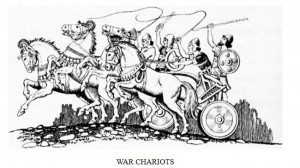Jeremiah has been warning his people of a coming invasion but they wouldn’t listen. He talked about the enemy coming upon the like a sirocco, a desert sand storm, comes upon them. Jeremiah is an extremely graphic writer. Then in  Jeremiah 4:13, he adds a three more pictures to illustrate the coming army. He writes, “Behold, he comes up like clouds; his chariots like the whirlwind; his horses are swifter than eagles— woe to us, for we are ruined!” Constance identifies the three images for us. She writes, “In verse 13 Jeremiah uses metaphors such as ‘clouds,’ ‘whirlwinds,’ and ‘eagles’ to describe the Babylonian army with chariots and war horses. The people, when they see what is happening, cry out, ‘Woe to us, for we are plundered!’”[1] How do clouds come up? The horses and chariots come on kicking up a storm cloud of dust all around them. You can see them coming from miles away.
Jeremiah 4:13, he adds a three more pictures to illustrate the coming army. He writes, “Behold, he comes up like clouds; his chariots like the whirlwind; his horses are swifter than eagles— woe to us, for we are ruined!” Constance identifies the three images for us. She writes, “In verse 13 Jeremiah uses metaphors such as ‘clouds,’ ‘whirlwinds,’ and ‘eagles’ to describe the Babylonian army with chariots and war horses. The people, when they see what is happening, cry out, ‘Woe to us, for we are plundered!’”[1] How do clouds come up? The horses and chariots come on kicking up a storm cloud of dust all around them. You can see them coming from miles away.
The clouds are not the kind that will bring gentle rains on the fields. They are the storm clouds of war. They are a harbinger of the destruction that’s about to come to Jerusalem. The “chariots” might best be translated as “vehicles of war” as the Handbook for Bible Translators suggests: If there is a general word for vehicle, then “vehicle for war” is a possible translation, or “vehicle for soldiers in war.” another way to render the second line would be to say “like a whirlwind, his soldiers are coming to attach in their vehicles,” or possibly “the horses are pulling his soldiers in their wagons as they attack like a whirlwind.”[2]
A modern rendition of this scene might be one of an armored tank division moving in. But it’s the same picture that one gets of General Sherman’s Northern Army on a rampage through Georgia! It’s interesting that the Army named their tank after this man. The point is when you see it coming, and you will see it coming, it will be impossible to stop. All of this represents the fulfillment of Moses’ prophecy in the book of Deuteronomy. Mackay noticed, “Here is the implementation of the covenant curse of Deut. 28:49, ‘The Lord will bring a nation against you from far away, from the ends of the earth, like an eagle swooping down.’”[3] The word that begins this verse, “behold” is better translated as a gasp! The weeping prophet is shaken by his own prophecy. Jeremiah weeps for his people. They have brought this calamity on themselves. Jesus too, weeps for Jerusalem who will reap the consequences of rejecting their Messiah.
[1] Mrs. T. M. Constance, Jeremiah, vol. 1 (Dickson, TN: Explorer’s Bible Study, 1978), 23.
[2] Barclay M. Newman Jr. and Philip C. Stine, A Handbook on Jeremiah, UBS Handbook Series (New York: United Bible Societies, 2003), 131.
[3] John L. Mackay, Jeremiah: An Introduction and Commentary: Chapters 1–20, vol. 1, Mentor Commentaries (Fearn, Ross-shire, Scotland: Mentor, 2004), 222.